仁爱英语七年级全册知识点归纳及练习
仁爱版七年级英语知识点梳理

仁爱版七年级英语知识点梳理Unit 1 How Do You Study for a Test?Vocabulary•academic (adj.) 学术的•advice (n.) 建议•chart (n.) 图表•classical (adj.) 古典的•experiment (n.) 实验•grade (n.) 年级,分数•method (n.) 方法•musician (n.) 音乐家•suggestion (n.) 建议,提议Useful Phrases•get ready for… 为…做好准备•make flashcards 制作抽认卡• a variety of 各种各样的•in order to 为了•take breaks 休息Grammar1.动词不定式•用于表达目的或意图–They study hard to get good grades.•接副词修饰–She plays the guitar beautifully to impress her friends.2.祈使句•用于表达建议或命令–Take a break and relax.Unit 2 What Is the Greenest Way to Travel? Vocabulary•bicycle (n.) 自行车•electric (adj.) 电动的•environment (n.) 环境•motorbike (n.) 摩托车•pollution (n.) 污染•public transportation 公共交通•recycle (v.) 回收利用•reuse (v.) 重复使用•walk (v.) 步行Useful Phrases• a lot of 很多•be made of 由…制成•in order to… 为了…•take advantage of 利用Grammar1.一般现在时•描述经常性活动或状态–I usually take the bus to school.•描述客观真理–The sun rises in the east.2.非谓语动词•表示相对于主语的动作或状态–I like walking in the park on weekends. Unit 3 Why Do You Like Pandas? Vocabulary•adorable (adj.) 可爱的•bamboo (n.) 竹子•behavior (n.) 行为•extinct (adj.) 灭绝的•habitat (n.) 栖息地•mammal (n.) 哺乳动物•natural (adj.) 自然的•survival (n.) 生存•wildlife (n.) 野生动物Useful Phrases•be famous for 因…而闻名•be used to 习惯于…•in danger 处于危险中•take care of 照顾Grammar1.一般过去时•描述过去的动作或状态–I liked pandas when I was young.•描述客观真理中的过去状态–Dinosaurs were extinct long before humans appeared.2.形容词的比较级和最高级•比较两个或多个物体或人的大小、高低、数量等–Pandas are cuter than koalas.•比较三个或三个以上物体或人的大小、高低、数量等–Elephants are the biggest land animals in the world. Unit 4 Can You Tell Me Where the Bank Is? Vocabulary•bank (n.) 银行•bookstore (n.) 书店•department store 百货商店•post office 邮局•skyscraper (n.) 摩天大楼•subway (n.) 地铁•supermarket (n.) 超市•traffic light 交通信号灯•turn left/right 向左/右转Useful Phrases•be across from 在…的对面•go straight 直走•next to 紧挨着•on the corner of 在…街角的Grammar1.介词短语表示方位•表示物体或人相对位置–The bank is across from the post office.•表示物体或人所在的位置–The supermarket is next to the bookstore.2.方位副词•表示方向或位置–Turn left at the traffic light.Unit 5 Do You Want to Watch a Game Show? Vocabulary•cheer (v.) 欢呼,喝彩•contestant (n.) 参赛者•entertainment (n.) 娱乐•host (n.) 主持人•live (adj.) 直播的•quiz (n.) 测验•reality show 真人秀•sitcom (n.) 情景喜剧•talent show 才艺秀Useful Phrases•have fun 玩得愉快•have a good time 过得愉快•in my opinion 在我看来•be similar to 与…相似Grammar1.情态动词 can 表示能力或请求•表示能力–I can speak Chinese and English.•表示请求–Can you help me with my homework?2.双宾语动词•受词可以是人也可以是物–My parents bought me a new bike for my birthday. Unit 6 I’m More Outgoing Than My Sister. Vocabulary•athletic (adj.) 运动的•creative (adj.) 有创造力的•friendly (adj.) 友好的•funny (adj.) 有趣的•outgoing (adj.) 外向的•quiet (adj.) 安静的•serious (adj.) 严肃的•shy (adj.) 害羞的•talkative (adj.) 多话的Useful Phrases•as…as 和…一样•be interested in… 对…感兴趣•in total 共计•be good at… 擅长于…Grammar1.形容词和副词的比较级和最高级•形容词比较级和最高级–My dog is bigger than yours.–Elephants are the biggest land animals in the world.•副词比较级和最高级–She sings better than everyone else in the class.–He always gets up the earliest in his family.2.非限制性定语从句•描述前面主句中人或物的情况–My sister, who is outgoing, loves making friends. Unit 7 What Does He Look Like?Vocabulary•bald (adj.) 秃头的•beard (n.) 胡子•curly (adj.) 卷曲的•handsome (adj.) 英俊的•mustache (n.) 小胡子•slim (adj.) 苗条的•tall (adj.) 高的•wavy (adj.) 波浪形的•overweight (adj.) 超重的Useful Phrases•be fond of 喜爱•be proud of 为…感到自豪•have a beard 留胡子•have curly hair 有卷发Grammar1.一般现在时表状态•描述可以看到或感觉到的状态–She has short, straight hair.•描述情感状态–They love animals and have a lot of pets.2.情态动词 should 表示建议•给出建议–You should eat more fruits and vegetables.Unit 8 How Was Your School Trip?Vocabulary•exciting (adj.) 令人兴奋的•get lost 迷路•hike (v.) 徒步旅行•learn about 学习•performance (n.) 表演•sightseeing (n.) 观光•souvenir (n.) 纪念品•visit (v.) 参观•waterfall (n.) 瀑布Useful Phrases•be afraid of 害怕•be surprised at 对…感到惊讶•look forward to 期待•take pictures 照相Grammar1.过去进行时•描述过去某个时刻正在进行的动作–We were hiking in the mountains when it started raining.•描述过去的某个时间段内正在进行的动作–They were sightseeing in Paris for a week.2.不定式作宾语•跟在某些动词、形容词或名词后面–We decided to visit the museum.Unit 9 How Do You Make a Banana Milk Shake? Vocabulary•blender (n.) 搅拌器•chop up 切碎•cook (v.) 烹饪•delicious (adj.) 美味的•ingredient (n.) 食材•mix (v.) 混合•recipe (n.) 食谱•salad (n.) 沙拉•sandwich (n.) 三明治Useful Phrases•add 加入•be good for 对…有益•instead of 代替…•follow…instructions 按照…的步骤Grammar1.现在进行时表示将来•表示已经安排好的未来事件–I am meeting my friends at the cinema tonight.•表示即将发生的事件–We are going to a party this weekend.2.不定式作状语•修饰动词–Jane went to the store to buy some fruits and vegetables.•修饰形容词或副词–It’s important to eat healthily and exercise regularly.Unit 10 I’d Like Some Noodles.Vocabulary•beef (n.) 牛肉•chicken (n.) 鸡肉•cook (n.) 厨师•duck (n.) 鸭肉•noodles (n.) 面条•pork (n.) 猪肉•seafood (n.) 海鲜•shrimp (n.) 虾•spicy (adj.) 辣的Useful Phrases•be allergic to 对…过敏•be full of 充满着…•be healthful 对…有益•be high in 富含…Grammar1.物主代词•代替名词作定语或宾语–His parents are both doctors.–I lost my phone on the way to school.2.祈使句表示命令或请求•命令–Try the spicy noodle soup. It’s really good.•请求–Could you pass me the salt, please?。
仁爱版七年级英语上册知识汇总(最新版)
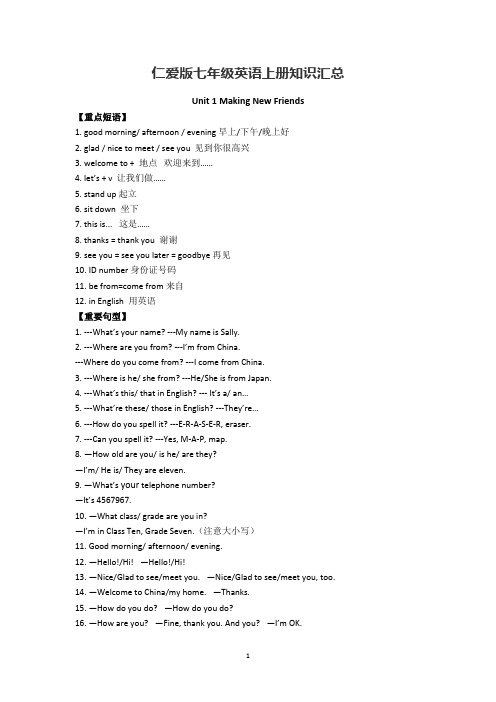
仁爱版七年级英语上册知识汇总Unit 1 Making New Friends【重点短语】1. good morning/ afternoon / evening 早上/下午/晚上好2. glad / nice to meet / see you 见到你很高兴3. welcome to + 地点欢迎来到……4. let’s + v让我们做……5. stand up 起立6. sit down 坐下7. this is... 这是……8. thanks = thank you 谢谢9. see you = see you later = goodbye 再见10. ID number 身份证号码11. be from=come from 来自12. in English 用英语【重要句型】1. ---What’s your name? ---My name is Sally.2. ---Where are you from? ---I’m from China.---Where do you come from? ---I come from China.3. ---Where is he/ she from? ---He/She is from Japan.4. ---What’s this/ that in English? --- It’s a/ an…5. ---What’re these/ those in English? ---They’re…6. ---How do you spell it? ---E-R-A-S-E-R, eraser.7. ---Can you spell it? ---Yes, M-A-P, map.8. —How old are you/ is he/ are they?—I’m/ He is/ They are eleven.9. —What’s your telephone number?—It’s 4567967.10. —What class/ grade are you in?—I’m in Class Ten, Grade Seven.(注意大小写)11. Good morning/ afternoon/ evening.12. —Hello!/Hi! —Hello!/Hi!13. —Nice/Glad to see/meet you. —Nice/Glad to see/meet you, too.14. —Welcome to China/my home. —Thanks.15. —How do you do? —How do you do?16. —How are you? —Fine, thank you. And you? —I’m OK.17. —See you then/ later. —See you.18. —Goodbye. —Bye.19. —Thank you. —You’re welcome./That’s OK./Not at all.【重点语法】1. 元音字母:Aa Ee Ii Oo Uu包含有以下元音的字母:[e] Aa Hh Jj Kk[i:] Ee Bb Cc Dd Gg Pp Tt Vv[aɪ] Ii Yy[ju:] Uu Qq Ww[e] Ff Ll Mm Nn Ss Xx Zz2. 大小写句首字母,人名,地名,称呼语,专有名词,星期的首字母要大写,引人注意。
仁爱版七年级上册英语全册知识点总结

考点一 thank的用法 【课文原句】 Thank you. 谢谢你。(七上P1) thank常用在日常交际中,表示对对方的感激之情。其常用 句型为thank sb. for (doing) sth.“因(做)某事而感谢某人”, 相当于“thanks for (doing) sth.”。
单项选择 4.(2019·预测)—Hello, this is Tina speaking. Is that Sam? —Sorry, he isn't here at this moment. _A__? A.Can I take a message B.What are you saying to Tina C.May I speak to Sam D.What's that speaking
【拓展】
词汇 helpful helpless
含义
用法
有帮助的;有用的
be helpful to...“对……有用 ”
feel helpless“感到无能为力 无助的;无法抑制的
”
用适当的介词填空 13.Bill has made great progress _w__it_h_ the help of his teacher.
单项选择
7.(2018·安徽中考)—Will you go to the picnic this Saturday?
—I'd like to, _A__ I'll have to help look after my baby sister.
A.but
B.or
C.and
D.so
8.(2018·湖北襄阳中考)—Be quick, _C__ we'll fail to catch
仁爱英语七年级上册知识点归纳完整版
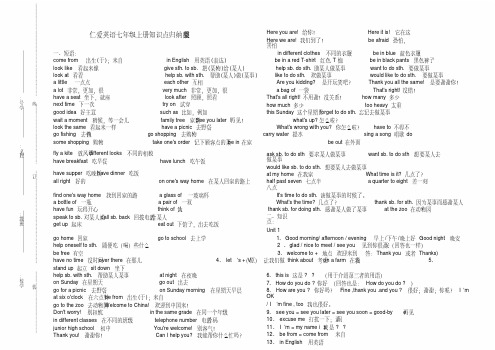
仁爱英语七年级上册知识点归纳完整版Here you are! 给你!Here it is! 它在这Here we are! 我们到了!be afraid 恐怕,害怕一、短语:in different clothes 不同的衣服be in blue 蓝色衣服come from 出生(于);来自in English 用英语(表达) be in a red T-shirt 红色 T 恤be in black pants 黑色裤子look like 看起来像give sth. to sb. 把(某物)给(某人) help sb. do sth.助某人做某事want to do sth. 要做某事look at 看着help sb. with sth. 帮助(某人)做(某事) like to do sth. 欢做某事would like to do sth. 要做某事a little 一点点each other 互相Are you kidding? 是开玩笑吧?Thank you all the same! 是要谢谢你!a lot 非常,更加,很very much 非常,更加,很 a bag of一袋That's right!没错!:号学线have a seat坐下,就座look after 照顾,照看next time 下一次try on 试穿good idea 好主意such as 比如,例如That's all right!不用谢!没关系!how many多少how much多少too heavy太重this Sunday这个星期日forget to do sth.忘记去做某事wait a moment 稍候,等一会儿family tree 家谱S ee you later再!见!what's up?怎么啦?look the same 看起来一样have a picnic 去野餐What's wrong with you?你怎么啦?have to不得不go fishing 去钓鱼go shopping 去购物carry water提水sing a song唱歌 do some shopping购物take one's order记下顾客点的菜be in 在家be out在外面:名姓fly a kite 放风筝different looks 不同的相貌have breakfast吃早餐have lunch 吃午饭ask sb. to do sth要. 求某人做某事want sb. to do sth想.要某人去做某事would like sb. to do sth.想要某人去做某事订have supper吃晚饭have dinner 吃饭all right 好的on one's way home 在某人回家的路上at my home在我家What time is it?几点了?half past seven七点半 a quarter to eight差一刻八点find one's way home 找到回家的路 a glass of 一玻璃杯It's time to do sth.该做某事的时候了。
七年级英语仁爱全册知识点

七年级英语仁爱全册知识点随着教育体制的改革,学生的英语学习从小学提前至中学。
作为初中的入门课程,七年级英语仁爱全册是一个关键的学习阶段。
本文将为大家介绍七年级英语仁爱全册中的重点知识点。
一、基础语法1.动词动词是句子中最重要的词性之一,表达行为和状态。
七年级英语仁爱全册中,我们需要掌握常用的动词时态、语态、情态动词等,以及常见的不规则动词的变化规律。
2.名词名词是句子中最基本的词性之一,用于描述人、事、物、地点等一切事物的名称。
在学习英语时,我们需要学会使用单数名词、复数名词、可数名词和不可数名词等。
3.形容词和副词形容词和副词是用来描述名词和动词的一种词性。
在七年级英语仁爱全册中,我们需要学会形容词和副词的用法,包括比较级和最高级,以及其在句子中的位置和修饰的对象等。
二、重点话题1.家庭和朋友在这个话题下,我们需要掌握常用的家庭成员和亲戚的称呼,家庭成员之间的关系,以及描述朋友和交谈的常用语句等。
2.学校生活和活动学校生活是每个学生都需要经历的。
在学习七年级英语仁爱全册时,我们需要掌握与学校生活和活动相关的词汇,比如教师、课程、考试、班级、活动等,以及能够表达自己在学校中的想法和感受。
3.旅游和文化旅游和文化是人们日常生活中的重要组成部分。
在这个话题下,我们需要学会与旅行和文化相关的词汇,包括景点、城市、文化遗产、美食等,以及能够用英语描述旅行经历和文化感受。
三、听力和阅读理解七年级英语仁爱全册中有大量的听力和阅读理解内容。
通过听读练习,我们可以提高自己的语感和理解能力,同时巩固所学的词汇和语法。
我们需要练习听取和理解不同语速、口音和语调的人说话,以及阅读不同难度和风格的文章。
综上所述,七年级英语仁爱全册中的知识点是广泛而丰富的。
通过认真学习和练习,我们可以提高自己的语言能力和技能,为今后的学习和工作打下坚实的基础。
七年级仁爱英语全册知识点

七年级仁爱英语全册知识点七年级仁爱英语全册是初中英语教材中的一本,主要涵盖了英语语法、单词、阅读理解等多个方面的知识点。
下面将详细介绍这本教材的主要知识点。
1. 语法知识点七年级仁爱英语全册中的语法知识点主要包括简单句、复合句、倒装句以及时态等方面。
在学习语法知识的同时,还需要注意各种句型的应用场景和使用方法。
例如,当我们学习到时态的知识点时,需要掌握现在时、过去时以及将来时的基本用法和变化规律。
同时,还需要了解各种时态的区别和应用场合。
这些知识点对于初中英语的学习都非常重要,必须认真学习和掌握。
2. 单词知识点在七年级仁爱英语全册中,单词也是重要的知识点之一。
对于初学者来说,单词的学习可能会比较枯燥和困难,但是通过刻意练习和积累,我们也可以掌握单词的正确用法。
在学习单词时,我们需要重点掌握单词的读音、拼写和意义。
同时,还需要注意各类单词的词性和应用方法,如名词、动词、形容词等。
通过逐步学习和积累,我们可以掌握越来越多的单词,从而更好地运用英语。
3. 阅读理解七年级仁爱英语全册还包括了多种阅读材料和练习题,这些材料不仅有助于提高我们的语言能力,还可以帮助我们更好地理解英文文章和语言表达。
当我们进行阅读理解时,需要注意各类文章的特点和结构,以便更好地进行分析和理解。
同时,还需要掌握各种阅读技巧,如预测、推理、识别关键词等。
通过不断进行练习和积累,我们可以提高自己的理解能力和应对各种文章的能力。
总的来说,七年级仁爱英语全册所包括的知识点非常广泛和全面,对于初学英语的学生来说,学习这些知识点是必不可少的。
我们应该通过不断学习和练习,逐渐掌握这些知识点,从而更好地运用英语。
(仁爱版)七年级英语总复习Unit 1知识点、练习和参考答案
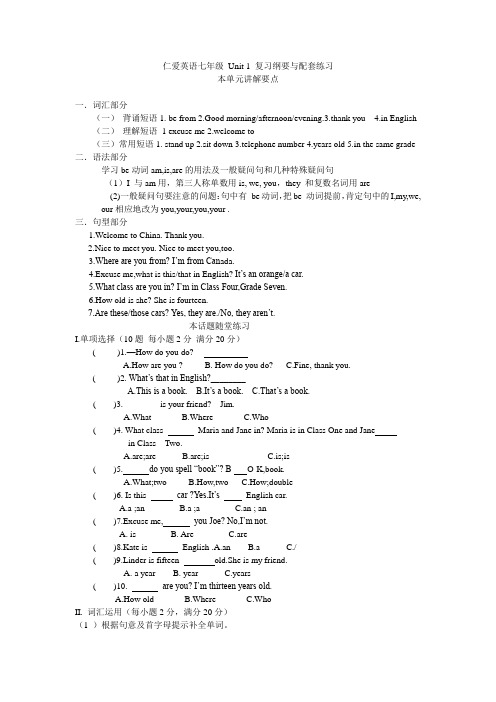
仁爱英语七年级Unit 1 复习纲要与配套练习本单元讲解要点一.词汇部分(一)背诵短语1. be from 2.Good morning/afternoon/evening.3.thank you 4.in English (二)理解短语 1 excuse me 2.welcome to(三)常用短语1. stand up 2.sit down 3.telephone number 4.years old 5.in the same grade 二.语法部分学习be动词am,is,are的用法及一般疑问句和几种特殊疑问句(1)I 与am用,第三人称单数用is, we, you,they 和复数名词用are(2)一般疑问句要注意的问题:句中有be动词,把be 动词提前,肯定句中的I,my,we,our相应地改为you,your,you,your .三.句型部分1.Welcome to China. Thank you.2.Nice to meet you. Nice to meet you,too.3.Where are you from? I’m from Can ada.4.Excuse me,what is this/that in English? It’s an orange/a car.5.What class are you in? I’m in Class Four,Grade Seven.6.How old is she? She is fourteen.7.Are these/those cars? Yes, they are./No, they aren’t.本话题随堂练习I.单项选择(10题每小题2分满分20分)( )1.—How do you do?--A.How are you ?B. How do you do?C.Fine, thank you.( )2. What’s that in English?________A.This is a book.B.It’s a book.C.That’s a book.( )3. ________is your friend? Jim.A.WhatB.WhereC.Who( )4. What class Maria and Jane in? Maria is in Class One and Janein Class Two.A.are;areB.are;isC.is;is( )5. do you spell “book”? B- O-K,book.A.What;twoB.How,twoC.How;double( )6. Is this car ?Yes.It’s English car.A.a ;anB.a ;aC.an ; an( )7.Excuse me, you Joe? No,I’m not.A. isB. AreC.are( )8.Kate is English .A.an B.a C./( )9.Linder is fifteen old.She is my friend.A. a yearB. yearC.years( )10. are you? I’m thirteen years old.A.How oldB.WhereC.WhoII. 词汇运用(每小题2分,满分20分)(1 )根据句意及首字母提示补全单词。
仁爱版英语七年级上册知识点归纳
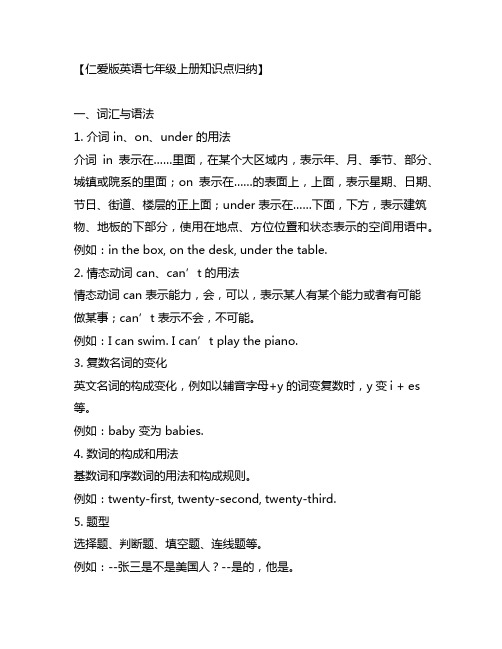
【仁爱版英语七年级上册知识点归纳】一、词汇与语法1. 介词 in、on、under 的用法介词in 表示在……里面,在某个大区域内,表示年、月、季节、部分、城镇或院系的里面;on 表示在……的表面上,上面,表示星期、日期、节日、街道、楼层的正上面;under 表示在……下面,下方,表示建筑物、地板的下部分,使用在地点、方位位置和状态表示的空间用语中。
例如:in the box, on the desk, under the table.2. 情态动词 can、can’t 的用法情态动词 can 表示能力,会,可以,表示某人有某个能力或者有可能做某事;can’t 表示不会,不可能。
例如:I can swim. I can’t play the piano.3. 复数名词的变化英文名词的构成变化,例如以辅音字母+y的词变复数时,y变i + es 等。
例如:baby 变为 babies.4. 数词的构成和用法基数词和序数词的用法和构成规则。
例如:twenty-first, twenty-second, twenty-third.5. 题型选择题、判断题、填空题、连线题等。
例如:--张三是不是美国人?--是的,他是。
二、阅读与表达1. 阅读准确度和理解能力能够根据所学知识,对文章、短文、图表等材料做准确、完整的理解和解读;能够运用所学的语言知识做出判断和解释。
例如:学习阅读文章,抓住信息点。
2. 表达和概括的能力学会用简洁的语言准确表达意思,总结概括文章中的重点信息。
例如:根据所学的语言知识,用简单易懂的语言总结文章内容。
3. 文章结构的认识和理解能够理解文章中的主体、开头、结尾;了解各种文章中表达的意思和结构。
例如:明白文章的开头、中间和结尾分别表达的意思及其结构。
三、写作与口语表达1. 完整的句子构成能力能够构成简单的句子,正确地使用句子成分和语序。
例如:主语+谓语+宾语的基本句型。
2. 简单句和复合句的使用能力能够灵活使用简单句和复合句表达自己的意思。
仁爱版七年级英语知识点

一、词汇Unit 11. pen pal 笔友2. write to sb 给人写信3. postcard 明信片4. from... to... 从……到……5. address 地址6. hobby 爱好7. collect 收集9. stamp 邮票10. different 不同的Unit 21. festival 节日2. take a trip 旅行3. Easter egg 复活节彩蛋4. plan 计划5. by... 在……的帮助下6. cook 烹饪7. chopsticks 筷子8. mooncake 月饼9. get together 聚会10. enjoy 享受Unit 31. have a party 聚会2. wear 穿着3. costume 装束4. decide 决定5. join 参加6. neighborhood 附近的7. celebrate 庆祝8. invitation 请柬9. even 即使10. goal 目标Unit 41. invention 发明2. kingdom 王国3. ancient 古代的4. famous 著名的5. iron 铁6. agriculture 农业7. Mongolian 蒙古人8. ruler 统治者9. wall 长城10. invent 发明Unit 51. canoe 小船2. voyage 航行3. voyageur 内陆探险家4. Canada 加拿大5. track 轨道6. explore 探索7. Oregon 俄勒冈8. expedition 探险9. continue 继续10. discover 发现Unit 61. examine 检查2. hurt 伤害3. symptom 症状4. treat 治疗5. cause 引起6. infection 感染7. prevent 防止8. medicine 药物9. vaccine 疫苗10. hospital 医院二、重点句子Unit 11. What's your hobby? 你有什么爱好?2. I like collecting stamps. 我喜欢收集邮票。
仁爱七年级全册英语知识点

仁爱七年级全册英语知识点As an English teacher for 7th grade students at Ren’ai Junior High School, I would like to provide a comprehensive overview of the knowledge points covered in the entire textbook. Through careful analysis of each unit, I have highlighted the most important vocabulary, grammar structures, and language skills, which are essential for the students' English learning. This article is designed to guide teachers, parents, and students to understand the scope and depth of the Ren’ai 7th grade English curriculum.Unit 1: Greetings and IntroductionsThis unit introduces how to greet people and make introductions. It focuses on vocabulary related to personal information such as names, ages, nationalities, and occupations. The students will also learn about basic subject-verb agreement rules and the present simple tense.Unit 2: School LifeThis unit explores school life vocabulary like subjects, teachers, classrooms, and school facilities. It also teaches descriptive adjectives and comparisons using 'as...as' and 'not as...as'. The students will learn how to describe their own school life and compare it with others.Unit 3: Family and FriendsThis unit teaches vocabulary related to family members and friendships. Students will learn how to ask and answer questions about their family members and describe their personalities. They will also learn how to use possessive adjectives and pronouns correctly.Unit 4: Hobbies and InterestsThis unit introduces different hobbies and interests. Students will learn vocabulary related to leisure activities like sports, music, and arts. The unit focuses on using the present continuous tense to talk about what people are doing at the moment.Unit 5: Food and DrinkThis unit explores food and drink-related vocabulary. Students will learn how to order food in a restaurant, express likes and dislikes, and describe food. They will also learn how to use countable and uncountable nouns correctly.Unit 6: TravelThis unit teaches travel-related vocabulary and grammar. Students will learn how to plan a trip, ask for directions, and book a hotel. The unit covers the present continuous tense and 'going to' future tense.Unit 7: Health and FitnessThis unit introduces health and fitness-related vocabulary. Students will learn how to describe symptoms of sickness and give advice on how to stay healthy. The unit covers modal verbs like 'should', 'can', and 'must' in their practical uses.Unit 8: Festivals and CelebrationsThis unit explores cultural festivals and celebrations around the world. Students will learn vocabulary related to different festivals and the customs and traditions of each. The unit focuses on using different tense structures to describe past and future events.In conclusion, the Ren'ai 7th grade English textbook covers a wide range of essential vocabulary, grammar structures, and language skills. Through careful study and practice in each unit, the students will master the necessary English knowledge points for effective communication. As a teacher, I believe that the curriculum is well-organized and practical, giving students a solid foundation in English learning to help them achieve success in their future studies and daily life.。
七年级全册知识点总结英语仁爱版
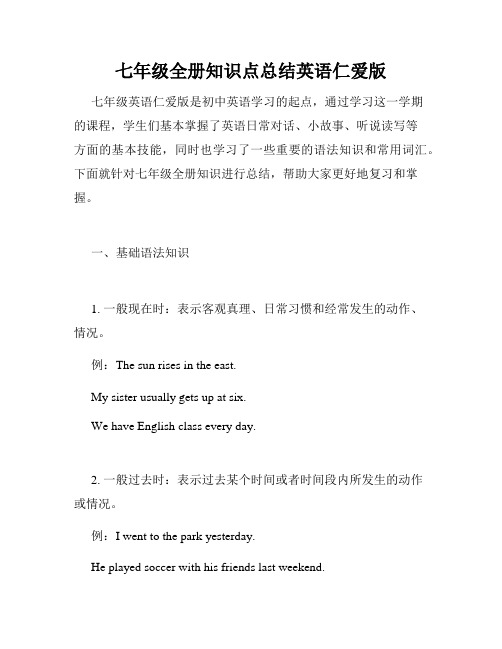
七年级全册知识点总结英语仁爱版七年级英语仁爱版是初中英语学习的起点,通过学习这一学期的课程,学生们基本掌握了英语日常对话、小故事、听说读写等方面的基本技能,同时也学习了一些重要的语法知识和常用词汇。
下面就针对七年级全册知识进行总结,帮助大家更好地复习和掌握。
一、基础语法知识1. 一般现在时:表示客观真理、日常习惯和经常发生的动作、情况。
例:The sun rises in the east.My sister usually gets up at six.We have English class every day.2. 一般过去时:表示过去某个时间或者时间段内所发生的动作或情况。
例:I went to the park yesterday.He played soccer with his friends last weekend.I studied math for two hours last night.3. 一般将来时:表示将来将要发生的动作或情况。
例:I will go to London next year.She is going to watch a movie this weekend.They won’t have a party tomorrow.4. 现在进行时:表示正在进行的动作或情况。
例:I'm listening to music now.She is reading a novel at the moment.They are talking on the phone.二、常用日常用语和表达1. 问候语:hello, hi, good morning/afternoon/evening, how are you, what's up, long time no see等。
例:Hi, Jack. How are you?Good morning, Mrs. Green. Nice to see you again.Long time no see. How have you been?2. 介绍和自我介绍: My name is..., Nice to meet you, How do you do, This is..., It's my pleasure to meet you等。
新版仁爱英语七年级上册知识点归纳

仁爱英语七年级上册知识点归纳Unit 1 Making New Friends一、元音字母:Aa Ee Ii Oo Uu包含有以下元音的字母:[e] Aa Hh Jj Kk [i:] Ee Bb Cc Dd Gg Pp Tt Vv [aɪ] Ii Yy[ju:] Uu Qq Ww [e] Ff Ll Mm Nn Ss ** Zz二、大小写句首字母,人名,地名,称呼语,专有名词,星期的首字母要大写,引人注意。
•Look!Is that Jane〞•He es from Hubei, China.•Mr. Wang, this is my mom.•What class are you in〞—I’m in Class Ten, Grade Seven.•On Sunday, we go to the West Hill for a piic.三、问候语1. Good morning/ afternoon/ evening.2. Hello!/ Hi! ---Hello!/ Hi!3. Nice/ Glad to see/ meet you. ---Nice/ Glad to see/ meet you, too.4. Wele to China/ my home. ---Thanks.5. How do you do〞---How do you do〞6. How are you〞---Fine, thank you. And you〞---I’m OK.7. See you then/ later. ---See you.8. Goodbye. ---Bye.9. Thank you. ---You’re wele./ That’s OK./ Not at all.四、数字句型1. How old are you/ is he/ are they〞---I’m/ He is/ They are eleven.2. What’s your telephone number〞---It’s 4567967.3. What class/ grade are you in〞--- I’m in Class Ten, Grade Seven.〔注意大小写〕五、重要句型及短语1.What’s your name〞---My name is Sally.2. Where are you from〞---I’m from China.Where do you e from〞---I e from China.3. Where is he/ she from〞---He/She is from Japan.4. What’s this/ that in English〞--- It’s a/ an……5. What’re these/ those in English〞---They’re……6. How do you spell it〞---E-R-A-S-E-R, eraser.7. Can you spell it〞---Yes, M-A-P, map.六、Be动词的用法•我用am,你用are,is用于他、她、它,单数用is,复数就用are。
新版仁爱英语七年级上册知识点归纳
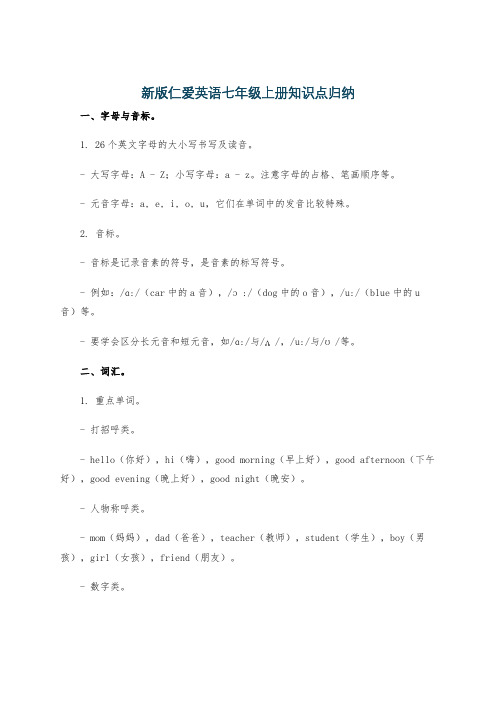
新版仁爱英语七年级上册知识点归纳一、字母与音标。
1. 26个英文字母的大小写书写及读音。
- 大写字母:A - Z;小写字母:a - z。
注意字母的占格、笔画顺序等。
- 元音字母:a, e, i, o, u,它们在单词中的发音比较特殊。
2. 音标。
- 音标是记录音素的符号,是音素的标写符号。
- 例如:/ɑ:/(car中的a音),/ɔ:/(dog中的o音),/u:/(blue中的u 音)等。
- 要学会区分长元音和短元音,如/ɑ:/与/ʌ/,/u:/与/ʊ/等。
二、词汇。
1. 重点单词。
- 打招呼类。
- hello(你好),hi(嗨),good morning(早上好),good afternoon(下午好),good evening(晚上好),good night(晚安)。
- 人物称呼类。
- mom(妈妈),dad(爸爸),teacher(教师),student(学生),boy(男孩),girl(女孩),friend(朋友)。
- 数字类。
- one,two,three,four,five,six(6),seven(7),eight(8),nine (9),ten(10)。
- 颜色类。
- red(红色),blue(蓝色),green(绿色),yellow(黄色),black(黑色),white(白色)。
- 文具类。
- pen(钢笔),pencil(铅笔),ruler(尺子),eraser(橡皮擦),book (书),notebook(笔记本)。
2. 单词的复数形式。
- 一般情况加 -s,如book - books,pen - pens。
- 以s, x, ch, sh结尾的加 -es,如box - boxes,bus - buses。
- 以辅音字母+y结尾的,变y为i加 -es,如baby - babies。
- 不规则复数形式,如man - men,woman - women,child - children。
仁爱版英语七年级上册知识点归纳总结
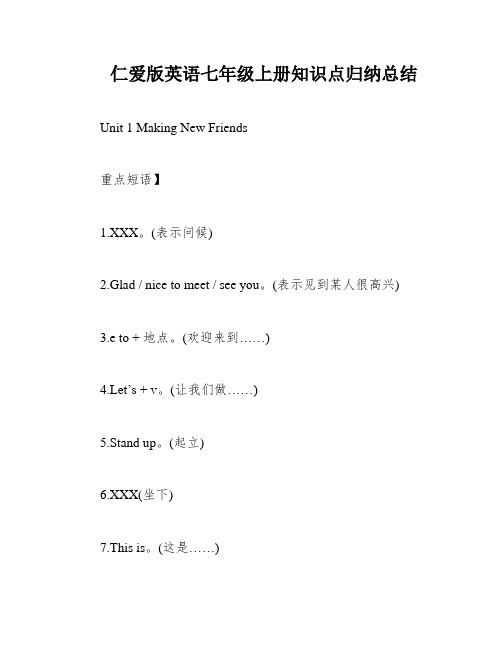
仁爱版英语七年级上册知识点归纳总结Unit 1 Making New Friends重点短语】1.XXX。
(表示问候)2.Glad / nice to meet / see you。
(表示见到某人很高兴)3.e to + 地点。
(欢迎来到……)4.Let’s + v。
(让我们做……)5.Stand up。
(起立)6.XXX(坐下)7.This is。
(这是……)8.Thanks = thank you。
(谢谢)9.See you = see you later = goodbye。
(再见)10.ID number。
(身份证号码)11.Be from = come from。
(来自)12.In English。
(用英语)重要句型】1.---What’s your name。
---My name is Sally.2.---Where are you from。
---I’m from China。
或者 ---Where do you come from。
---I come from China.3.---Where is he/she from。
---He/She is from Japan.4.---What’s this/ that in English。
---It’s a/an…5.---What’re these/ those in English?---They’re…6.---How do you spell it。
---E-R-A-S-E-R。
eraser.7.---Can you spell it。
---Yes。
M-A-P。
map.8.---How old are you/ is he/ are they。
---I’m/ He is/ They are XXX.9.---XXX。
---It’s xxxxxxx.10.---What class/ grade are you in。
---I’m in Class Ten。
仁爱英语初中七年级知识点归纳

仁爱英语初中七年级知识点归纳本文档将对仁爱英语初中七年级的知识点进行归纳和总结。
1. 语法知识点初中七年级的语法知识点主要包括以下内容:- 名词:包括可数名词和不可数名词的用法及其复数形式。
- 代词:人称代词、物主代词、反身代词等的用法和变化形式。
- 动词:be动词的基本用法、一般现在时和一般过去时的动词变化规则。
- 形容词和副词:基本形容词和副词的用法以及比较级和最高级的形式变化。
- 介词:常用介词的用法以及其与动词、名词等的搭配。
2. 词汇知识点初中七年级的词汇知识点包括以下内容:- 基本词汇:介绍一些常见的英语单词及其词义和用法。
- 日常用语:介绍一些常用的日常用语及其表达方式。
- 动词短语:介绍一些常用的动词短语及其在句子中的用法。
3. 句型知识点初中七年级的句型知识点包括以下内容:- 简单句:介绍简单句的基本结构、肯定句、否定句和疑问句的构成方式。
- 并列句:介绍并列句的组成方式及其使用场景。
- 定语从句:介绍定语从句的用法和关系代词的使用。
- 状语从句:介绍状语从句的引导词及其在句子中的位置和作用。
4. 阅读技巧初中七年级的阅读技巧包括以下内容:- 预测:根据标题、插图或段落首句等,预测文章的主题或发展方向。
- 掌握重点信息:通过阅读文章并标记关键信息,提高对文章内容的理解。
- 推断:根据文章中的暗示或线索,进行合理的推理和推断。
- 猜测词义:通过上下文的提示,猜测生词的词义。
以上是对仁爱英语初中七年级的知识点进行的简要归纳和总结,希望对同学们的学习有所帮助。
请同学们根据自己的实际学习情况,按计划有针对性地复习和掌握这些知识点。
如有任何问题,请随时向老师请教。
仁爱版七年级英语(上册)知识点归纳

英语七年级纳Unit1MakingNewFriends. 一.重点短语1.Goodmorning/afternoon/evening!早上/下午/晚上好!Goodnight:晚安〔晚上辞别〕! 2.Glad/Nicetomeet/seeyou!见到你很快乐〔答复也一样〕 3.Welcometo+地点:欢送来到⋯⋯回(答:Thankyou 或者Thanks) 4.l e t’d so +〔形〕:做⋯⋯5.standup:起立sitdown:坐下6.单数:thisis-----这是⋯⋯〔用于介绍第三者的用语〕 复数:theseare-----这些是7.Howdoyoudo?你好〔答复也是:Howdoyoudo?〕8.Howareyou?你好吗? Fine,thankyou/thanks.Andyou?很好,谢;你呢? I ’mOK/I ’mfine,to 我o .也很好。
9.Seeyou=Seeyoulater=Seeyousoon=good-bye 再见10.excuseme 打搅一下;请问11.做自我介绍:I ’--m ---=mynameis----我是⋯⋯ 12.befrom=comefrom:来自 13.inEnglish:用英语表示14.Canyouspellit?Yes/No.你能拼写它吗?能/不能Howdoyouspellit?M-A-P,map.你怎样拼写它?15.That ’sOK/That ’sallright/You/Nota ’tarllew !elco 不m e 用谢 16.⋯⋯yearsol:d ⋯⋯岁如:I ’mtwelveyearsold. 17.telephonenumber :QQnumber :QQIDnumber :XX18.thesame:一样的反义词是different:不同的Word 完美格式例:Weareinthesamegrade,butweareindifferentclasses.二.重点句型:19.Whatisyourname?你的名字是什么?20.Where+be+主语+from?某人来自于哪里?〔答复:主语+be+地点〕eg:Whereareyoufrom?IamfromChina.21.Howold+be+主语?某人几岁?(答复:主语+be+数字)例:Howoldareyou?Itwe’l v e m.22.Whatisyourtelephonenumber?你的是多少?个读答复:Mytelephonenumberis--或者It’--s注意:读出的时候要逐出。
(完整word版)仁爱版七年级英语知识点(全),推荐文档

七年级上册Unit 1 Making New FriendsTopic 1 Welcome to China!重点:1. 字母(1)26个英语字母的大小写形式(2)5个元音字母:Aa Ee Ii Oo Uu2. 交际英语(1)—Good morning! —Good afternoon!—Good evening!—Good night!—Good morning! —Good afternoon!—Good evening!—Good night!早上好!下午好!晚上好!晚安!(2)Thank you.=Thanks.谢谢。
(3)—Hello/Hi!—Hello/Hi!你好!(4)—How do you do ?—How do you do ?你好!(初次见面)(5)—How are you ? 你好!—I`m fine(OK),thank you (thanks).我很好,谢谢!(6)—Nice to meet /see you.见到你很高兴。
—Nice to meet/see you,too。
见到你也很高兴。
(7)—See you later.再见。
—Good bye.再见。
—See you. —Good bye./Bye-bye.?/Bye.3. 短语(1)welcome to 欢迎到…..4. 句型(1)—I am Kangkang.Are you Michael?我是康康。
你是迈克尔吗?—Yes,I am.是的,我是。
/No,I`m not.不,我不是。
(2)This is Michael. 这是迈克尔。
This is Miss Wang. 这是王老师。
This is +人/物用来给对方介绍人或者物等。
5. 语法Be动词I用am, You用are,is跟着他她它;单数用is,复数就用are;变疑问,提前它;变否定,更容易,be后not加上去;疑问否定任你变,句首大写莫忘记,句末问号莫忘记。
仁爱英语七年级(上册)知识点归纳

..仁爱英语七年级上册知识点归纳Unit1一.常用表达法1.Good morning/afternoon/ evening早上/下午/晚上好Good night晚安(晚上告别)2.Glad/ nice to meet / see you见到你很高兴(回答也一样)例:-Nice to meet you.-Nice to meet you,too.3.Welcome to +地点欢迎来到⋯⋯(回答:Thank you或者Thanks)注意:如果地点是here或者there就不能用to.4.This is......这是⋯⋯(用于介绍第三者的用语)5.How do you do ?你好(回答也是:How do you do ?)6.Stand up起立Sit down坐下7.-How are you ?你好吗?-Fine\Notbad\Verywell,thank you .and you?很好;谢谢;你呢?-I’m OK / I’m fine, too .我也很好。
8.See you = Bye = Goodbye再见9.-Hereyouare.给你。
-Thankyou.谢谢。
10.excuse me.打扰一下;请问Excuse me,are youJane?11.I’m-----=my name is ----我是......She’s⋯=Her name is⋯她是......He’s⋯⋯=His name is⋯他是......例:-My name is Michael./I’m Michael.12.be from=come from来自●用be from时要注意与前面人称搭配,用不同的be动词He/She/It is from China.They/We/You are from China.I’m from China.●用come from时,要注意与第三人称进行搭配时用comes。
He/She/It comes from Canada.13.fullname全名familyname\lastname姓givenname\firstname名14.telephone number电话号码QQnumber QQ号码ID number身份证15.-Thankyouverymuch.\Thanksalot.\Manythanks.非常感谢你。
- 1、下载文档前请自行甄别文档内容的完整性,平台不提供额外的编辑、内容补充、找答案等附加服务。
- 2、"仅部分预览"的文档,不可在线预览部分如存在完整性等问题,可反馈申请退款(可完整预览的文档不适用该条件!)。
- 3、如文档侵犯您的权益,请联系客服反馈,我们会尽快为您处理(人工客服工作时间:9:00-18:30)。
仁爱英语七年级上、下册知识点归纳及练习Unit 11、Good morning/ afternoon / evening ! 早上/下午/晚上好!2、Good night! 晚安(晚上告别)3、Nice to meet / see you! 见到你很高兴(回答也一样)4、Welcome to + 地点欢迎来到……(回答:Thank you 或者Thanks)5、Let's + V(原形)让我们做……Let's go!6、Stand up! 起立Sit down! 坐下7、This is----- 这是……(用于介绍第三者的用语)8、How do you do ?你好(回答也是:How do you do ? )9、How are you ? 你好吗?Fine ,thank you .And you ? 很好;谢谢;你呢?I'm OK / I'm fine , too . 我也很好。
10、See you. = See you later. = See you soon. = Goodbye! 再见11、Excuse me,---- 打扰一下;请问----12、I'm -----= My name is ---- 我是……13、be from = come from 来自14、in English 用英语16、That's OK. / That's all right. / You're welcome. / Not at all . 不用谢17、telephone number 电话号码; QQ number QQ号码; ID number 身份证18、the same (相同的)反义词是different (不同的)例: We are in the same grade, but we are in different classes.句型:1. What is your name ? 你的名字是什么?2. Where +be + 主语+ from? 某人来自于哪里?(回答:主语+be+地点)Where are you from? I am from Guangzhou.3. How old + be + 主语?某人几岁?(回答:主语+ be + 数字)例:How old are you ? I'm fourteen (years old).4.What is your telephone number? 你的电话号码是多少?(回答:My telephone number is---或者It's ---)注意:读出号码的时候要逐个读出。
5. What class / grade +be + 主语+ in ? 某人在哪一个班级/年级?例:What class are you in ? I am in Class Five. (注意:Class 和Five 需要大写)What grade are you in ? I am in Grade Seven.(注意:Glass和Seven需要大写)6. What's this/ that (in English) ? 这/那是什么?(回答:It's a/an+ 单数名词. 这是……)What' re these/ those (in English) ? 这/那些是什么?(回答:They're + 复数名词这些是……)7. How do you spell it ? 你怎么拼写它?E-R-A-S-E-R, eraser. (注意拼读方法)11/ 1Unit 21、sb + has/ have+ ( an /a ) + adj + 五官==sb's 五官is / are + adj (描述长相) 例:Lily has a small nose. = Lily's nose is small.2、I know. = I see. 我明白了3、That's right . 那是对的4、look the same; look like看起来相像look different 看起来不同例:Jim and Lilei look the same.== Jim looks like Lilei. .5、look at + n 看某物; look for +n寻找某人/某物; look after +sb. 照顾某人6、both两者都……all 三者或者三者以上都……both 和all位于be动词或情态动词后,位于实意动词前。
例:We are both students. We both have black eyes.We can both speak English.7、give sth . to sb. = give sb. sth. 把某物给某人;8、over there 在那边come in 请进go out 出去10、in + 颜色或in a/an/the +颜色+ 衣服表示穿着……颜色的衣服如: The girl in red is my sister. The girl in a red dress is my sister.11、too + adj 太……too old_________ too young_________12、pants 和shoes 做主语,谓语动词用复数;但a pair of pants/ shoes作主语时,谓语动词用单数形式例:His shoes are black. A pair of shoes is under the bed.13、in the morning/ afternoon/ evening 在早上/下午/晚上14、go shpping去购物类似结构go swimming_______ gofishing___________15、help sb with sth 在某方面帮助某人注意:sb 用代词时必须用宾格help sb do sth 帮助某人做某事My teacher often help me with my English.___________________Maria 帮我打扫教室_________________________________17、think of 认为,想;think about 考虑;句型:1、What do/does + 主语+ look like ? 询问人的长相例: What does your English teacher look like ?2、Whose +物+ is this/ that ?Whose +物+are these/ those ? 这/这些是谁的……?例:Whose coat is this ? It is mine.Whose shoes are these ? They are hers.3、Who is the letter from? 这封信来自于谁?It's from Lily. 它来自于莉莉。
4、What color be + 东西?(回答:It's +颜色. 或者They' re + 颜色) 例:What color is your dress? It's black.Unit 31、Could you (please)……?(后接动词原形)你愿意做某事吗?May I ……? (后接动词原形)我能做某事吗?2、live in + 地点; 住在某地live with +人; 和某人住在一起11/ 23、What does he say in the letter? 他在信里说了些什么?4、a lot = very much 放在句末,修饰动词,非常……例:I like the boy a lot/ very much.not at all 一点也不……例:I don't like the boy at all.5 、very放在形容词前例:My cat is very cute .6、each other 相互,彼此We ofen help each other.7、No problem. 没问题. 8、eat out 出去吃饭9、speak + 语言;(说某种语言)speak English speak Chinese10、the Great Wall 长城the English corner 英语角11、come/go to + 地点去某地; 但home 、here 、there这些是副词,前面不能加to 例:go home come here________ go there___________go to do sth去做某事例:They go to play basketball. 13、like doing sth 喜欢做某事(习惯)like to do sth想要做某事(一次性)14、office worker 办公室职员cook 厨师cooker炊具15、on a farm 在农场上in the school 在学校16、a photo of one's family某人的全家照Family Tree 家谱(首字母都大写)17、in a hospital 在医院(纯属地点概念)in hospital 因病住院例:He is ill in hospital. 他生病住院He is in a hospital.他在医院里(不一定是因为生病来到医院)18、Help oneself ( to sth. ) 请随便(吃…)Help yourself/ yourselves (to some fish)!19、I'd like sth = I would like sth. 我想要……20、Would like to do sth = want to do sth 想要做某事21、Would you like something to eat (drink)? 你想要一些吃(喝)的东西吗?to eat 或to drink 修饰something,作为后置定语。
22、Here you are . 给你Here we are. 我们到了23、What about ……? == How about ……? ……怎么样?后接代词或名词,还可以接动词ing形式(即What about doing sth )24、a cup of tea 一杯茶two cups of tea两杯茶25、Milk for me. 我要牛奶26、Why not …?(后接动词原形)= Why don't you …?(后接动词原形)为什么不做某事呢?回答:Good idea . 好主意;27、May I take your order ? 可以点菜了吗?28、Can I help you ?= May I help you ?= What can I do for you ? 需要帮忙吗?29、have dinner/ breakfast /lunch/supper 吃正/早/午/晚餐30、a kind of 一种……all kinds of 各种各样的……39、be friendly/kind to sb 对某人友好例:我的同班同学们对我很好。
